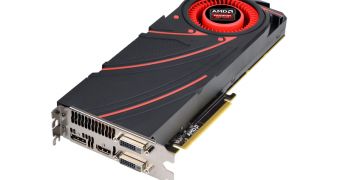Inflation is always around, ready to pounce, but the way the prices of AMD's Radeon R9 series graphics cards rose over the past month is a bit ludicrous. Sadly, it is real, no matter how much people might want to believe otherwise.
Supply and demand need to be in equilibrium in order for a market segment to have any sort of consistency, price-wise.
Alas, the supply-demand ratio on the market of AMD high-end graphics cards is a bit skewed, because the demand is beyond what anyone expected.
In the beginning, it was easy enough to understand, what with Radeon R9 280X priced at $299 / €299 and the R9 290 at $399 / €399.
Strangely, however, the initial demand didn't taper off at all, even as prices quickly climbed, and now orders are as strong as ever even though the R9 290 has gone from $399 / €399 to $499 / €499 or more.
Most online and street vendors don't even have the cards in stock anymore, and those that do (like Newegg in this case) aren't likely to pull prices back to what they should be, not when customers still order them like crazy.
It's the winter holidays after all, and one needs to give a good gift to their techie friends.
So what, exactly, caused the price inflation? No one really knows. For that matter, no one knows just how many cards AMD shipped to retailers either.
Also, the cards only came out back in September, and retail availability only arrived a month ago or so. Which means that we're still experiencing the initial burst of orders by those who weren't interested in NVIDIA cards but couldn't resist the price-performance ratio of AMD's newcomers.
Of course, with the inflation we have mentioned, this demand should slow down. It just isn't, as the many stores with “out of stock” notices will tell you.
TechSpot says that mining for cryptocurrency might be behind it, since GPUs can do the parallel computing tasks a lot easier than CPUs, and AMD's Radeon chips are the best for the jobs (Bitcoin, Litecoins, etc.).

 14 DAY TRIAL //
14 DAY TRIAL //